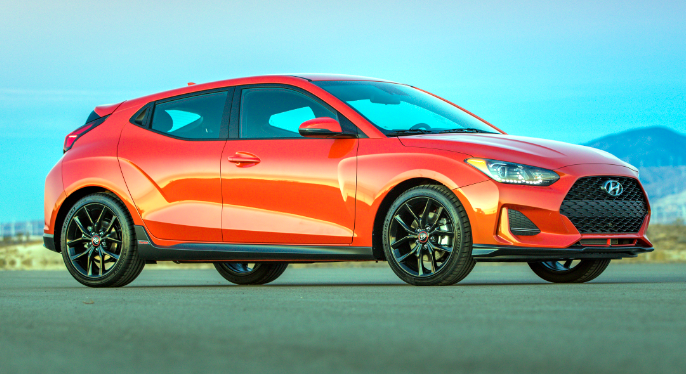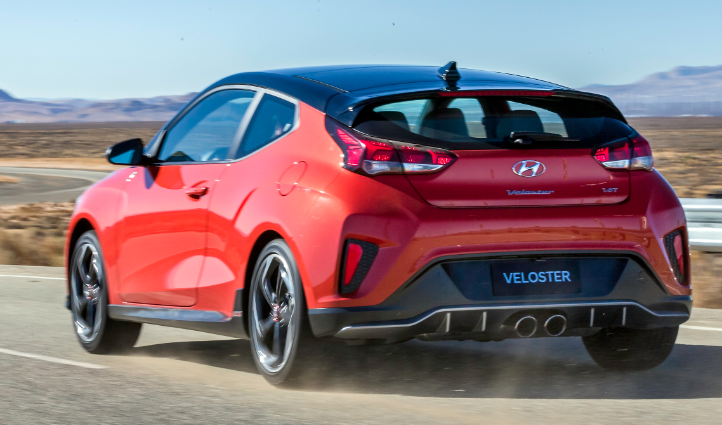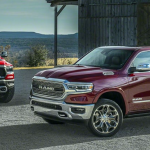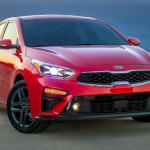
 DETROIT—Hyundai took the wraps off a redesigned version of its unconventional compact sporty hatchback at the 2018 North American International Auto Show in Detroit. The 2019 Veloster retains the model’s novel asymmetrical door configuration (one on the driver’s side, and two on the passenger side for easier access to the back seat), but gains all-new styling inside and out, updated powertrains, and a host of new technology features. Hyundai is also using the new Veloster as the inaugural vehicle of a planned “N” lineup of high-performance Hyundais.
DETROIT—Hyundai took the wraps off a redesigned version of its unconventional compact sporty hatchback at the 2018 North American International Auto Show in Detroit. The 2019 Veloster retains the model’s novel asymmetrical door configuration (one on the driver’s side, and two on the passenger side for easier access to the back seat), but gains all-new styling inside and out, updated powertrains, and a host of new technology features. Hyundai is also using the new Veloster as the inaugural vehicle of a planned “N” lineup of high-performance Hyundais.
More from the Detroit Auto Show
Base Veloster models are powered by Hyundai’s 147-horsepower 2.0-liter 4-cylinder, which can be paired with a 6-speed-manual transmission or a 6-speed automatic. The performance Turbo model returns, and now offers an R-Spec version. Veloster Turbos get a turbocharged 1.6-liter that puts out 201 horsepower and is available with a 6-speed manual or 7-speed dual-clutch automated-manual transmission. All Veloster Turbo models are equipped with an Active Sound Design feature, which enhances sporty powertrain sounds in the cabin.

The high-performance Veloster N boasts special trim inside and out, as well as a turbocharged direct-injection 2.0-liter 4-cylinder paired with a short-throw 6-speed manual transmission with downshift rev-matching capability. The powertrain makes up to 275 horsepower and 260 pound-feet of torque, and includes a multi-mode performance exhaust system.
Other high-performance features on the Veloster N include a multi-mode electrontically controlled suspension, available limited-slip differential, available upsized performance brakes, 18- or 19-inch wheels on high-performance Michelin Pilor Sport or Pirelli P-Zero tires, and a “Grin Control System” drive-mode selector that dials in specific powertrain and suspension settings.
Available Veloster technology/convenience features include wireless device charging, Apple CarPlay/Android Auto functionality, a heads-up display, 8-inch touchscreen audio/navigation system, and Hyundai’s Blue Link connectivity features such as a car finder and remote locking/unlocking/starting.
Available safety equipment includes forward collision warning with automatic emergency braking, blind-spot monitor with rear cross-traffic alert, lane-keep assist, adaptive cruise control, and a driver-attention monitor.
Hyundai has not yet released pricing, but the 2019 Veloster and Veloster Turbo are slated to go on sale in the second quarter of 2018. The Veloster N is set to follow in the fourth quarter of 2018.
CG Says:
We were never huge fans of the first-generation Veloster, which ran from 2011-2017. Its asymmetrical-door configuration was certainly novel—and offered an extra margin of practicality over a conventional two-door sporty compact—but the Veloster’s steeply sloped rear roofline made for subpar rear visibility and rear-seat headroom. The base Veloster was rather slow, and the notably zippier Turbo didn’t quite achieve the suspension refinement and agility of some competitive sporty compacts. However, Hyundai has improved the handling finesse of its recent new vehicles, and the Veloster’s new base engine should help it feel a bit peppier. If the 2019 Veloster’s zany styling and unconventional body configuration don’t appeal to you, we’d point you toward Hyundai’s excellent Elantra GT, a more conventional four-door compact hatchback that was redesigned for 2018.
The real surprise here is the Veloster N. Judging by the N’s specs, Hyundai is looking to push into the realm of the recently introduced Honda Civic Type R, and maybe siphon some sales from AWD rivals such as the Volkswagen Golf R and Subaru WRX. We’ll be very curious to see where the Veloster N lands price-wise, and how quickly and broadly additional N high-performance variants will proliferate across Hyundai’s model lineup.
Flat-out Funky: The 2013 Hyundai Veloster Turbo’s Matte Gray Paint Option


